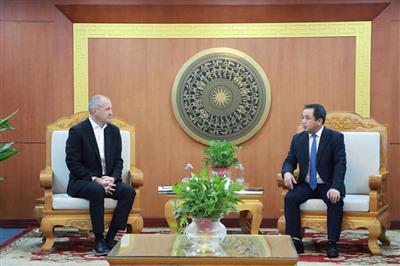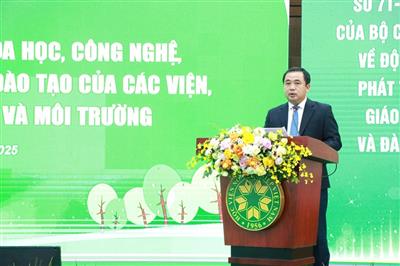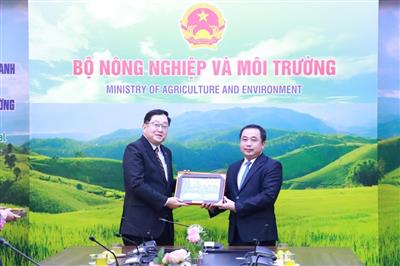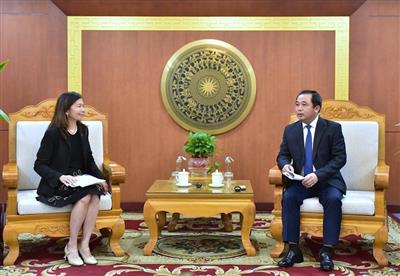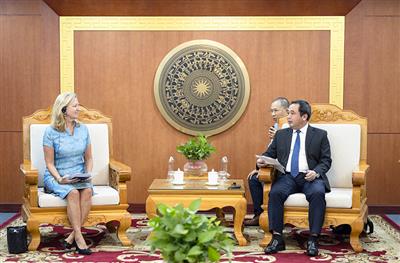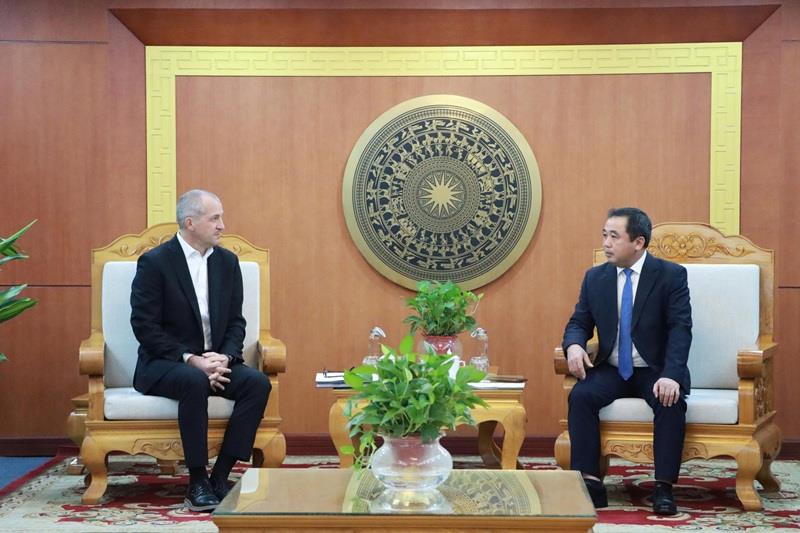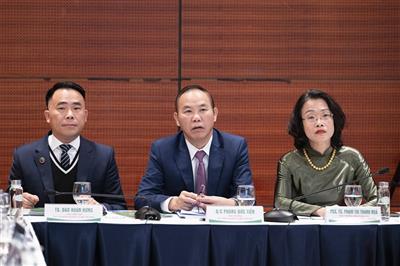
APEC food security and Vietnam’s policy orientation
12/08/2025TN&MTOn August 10 in Incheon, Republic of Korea, the APEC Food Security Ministers’ Meeting convened with the participation of member economies. Representing Vietnam, Acting Minister of Agriculture and Environment Tran Duc Thang emphasized the country’s ongoing policy innovations in the agri-food system and shared the pressing challenges that must be addressed to build a prosperous, sustainable, and responsible APEC region in the face of global food security concerns.
Food security: A key priority for APEC
The meeting adopted a Joint Statement reaffirming that food security is not only a domestic socio-economic issue for individual economies but also a pillar for regional stability, connectivity, and prosperity. The document highlighted the need for member economies to advance sustainable, resilient, and inclusive agri-food systems, aligned with the APEC Food Security Roadmap to 2030, the Putrajaya Vision 2040, and the Aotearoa Plan of Action.
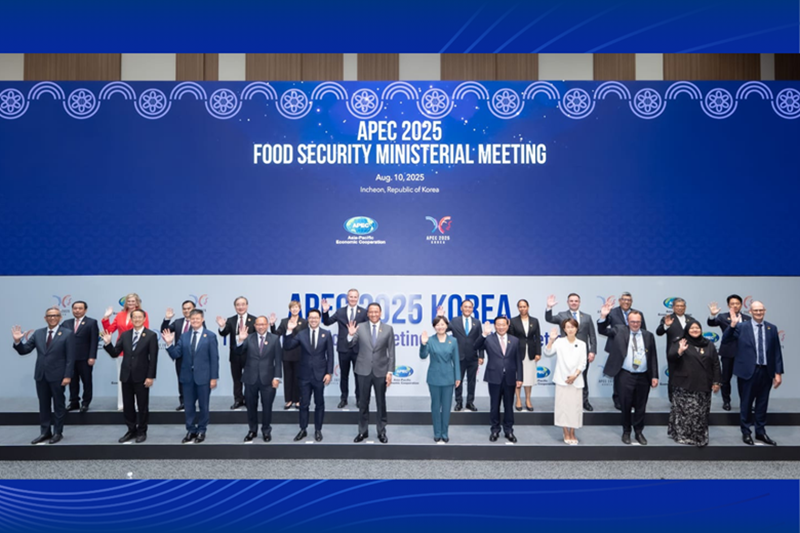
APEC ministers responsible for food security issued a joint statement following their meeting in Incheon, to strengthen cooperation on building productive, sustainable, resilient and innovative agri-food systems
A notable element of the Statement was the recognition of innovation as a catalyst for boosting productivity, reducing post-harvest losses, fostering green agricultural value chains, and enhancing resilience to climate change. It also underscored the role of fair, transparent, and non-discriminatory trade in maintaining food flows and preventing supply chain disruptions amid global uncertainties.
Another key aspect was the linkage between food security and inclusive development. The Joint Statement stressed the importance of supporting rural commjkunities, women, and youth to engage more deeply in agri-food systems—viewed as essential for ensuring social equity and sustainable development. Thus, food security was approached not only in terms of production and consumption but also as a social dimension encompassing poverty reduction, income generation, and job creation.
In this context, Acting Minister Tran Duc Thang’s remarks aligned Vietnam’s national perspective with the region’s shared vision. He stated: “Food security is considered critical not only for regional prosperity but also globally. For an agricultural country like Vietnam, where over 60 percent of the population lives in rural areas, ensuring food security is not only about sufficient quantity but also about improving quality and food safety, thereby contributing to social stability, poverty reduction, sustainable development, and maintaining Vietnam’s position as an agricultural exporter.”
This approach demonstrates that Vietnam is not a passive participant in the APEC process, but is positioning food security as a strategic priority in agricultural and environmental policymaking—anchoring national interests within the collective interests of the region.
Vietnam’s agri-food policy innovations
Speaking at the APEC meeting, Acting Minister Tran Duc Thang emphasized that innovation in the agri-food system is central to Vietnam’s agricultural restructuring, guided by the objectives of being “greener, smarter, and more inclusive.” He reaffirmed that Vietnam is pursuing a transformation pathway rooted in green growth, emission reduction, and enhanced resilience, thereby contributing to both regional and global food security. These orientations are consistent with the Joint Statement’s call for building “sustainable, resilient, and innovative agri-food systems” and for accelerating digital transformation across value chains.
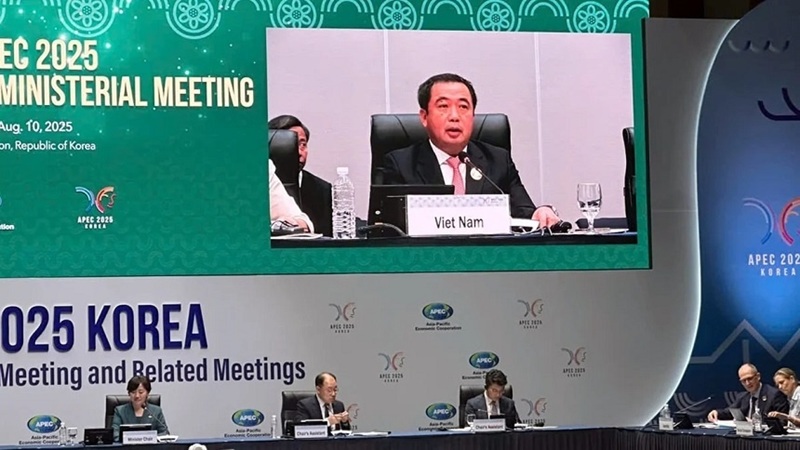
Acting Minister Tran Duc Thang delivers remarks at the APEC Food Security Ministers’ Meeting, underscoring the central role of food security in regional and global prosperity and reaffirming Viet Nam’s commitment to sustainable agriculture
On emission reduction toward Net Zero, Vietnam is implementing the program “One Million Hectares of High-Quality, Low-Emission Rice in the Mekong Delta by 2030” under Decision No. 1490/QĐ-TTg. The program restructures value chains and applies sustainable farming practices to “enhance value, protect the environment, adapt to climate change, and reduce greenhouse gas emissions,” thereby operationalizing Vietnam’s international commitments. By 2025, tens of thousands of hectares of pilot models have already been established, reflecting the country’s determination to place rice production firmly on a low-emission trajectory.
On science, technology, and digital transformation, Vietnam regards digital technology and artificial intelligence (AI) as drivers for optimizing the entire chain—from production and processing to distribution. As the Acting Minister highlighted, AI is “not merely a technology but a tool to reshape the entire value chain—from farm to fork—enhancing productivity, reducing losses, and mitigating supply chain disruptions.” This approach resonates with APEC’s direction to “accelerate digital transformation of agri-food systems” to raise efficiency and resilience.
On climate adaptation and rural livelihoods, Vietnam is advancing climate-smart production models, circular agriculture, and strengthened food safety systems. At the APEC forum, the Vietnamese delegation proposed four areas of cooperation: boosting investment in innovation; accelerating digital transformation and AI; building sustainable and inclusive supply chains; and strengthening collaboration on standards, traceability, and food safety to reduce risks, enhance resilience, and safeguard farmers’ livelihoods. The Ministry of Agriculture and Environment plays a central role in advising policy, representing Vietnam at the meeting, and coordinating the implementation of these flagship programs.
These policies place Vietnam firmly on a trajectory consistent with APEC’s shared orientation toward “innovative, inclusive, and sustainable” agri-food systems, while also translating into action the climate commitments announced at COP26 and COP28, including the goal of carbon neutrality by 2050 as declared by the Prime Minister.
Challenges and directions for cooperation within APEC
Speaking at the conference, Acting Minister of Agriculture and Environment Tran Duc Thang emphasized that APEC economies are facing a host of challenges that threaten food security, from climate change and declining land and water resources to market volatility and outbreaks in the agriculture–food system. He noted: “Climate change continues to bring droughts, floods, saltwater intrusion and other extreme events that directly affect farmers’ livelihoods. Meanwhile, the depletion of natural resources and market instability heighten the risk of supply–demand imbalances in food across the region.”
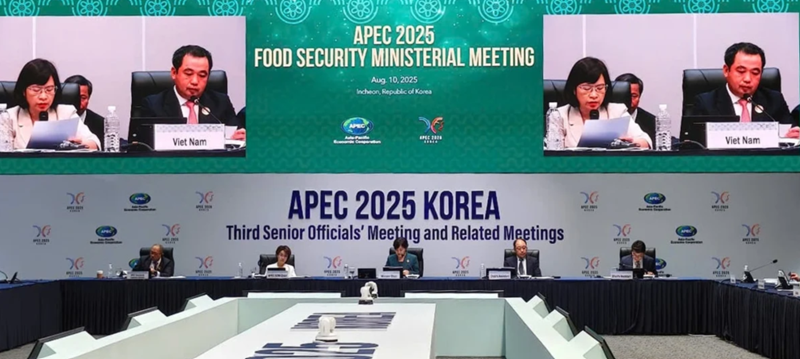
Acting Minister Tran Duc Thang emphasized that APEC, with nearly 3 billion people, plays a crucial role in advancing agri-food trade and sustainable food systems, while still facing cross-border challenges from technology gaps to trade barriers
From this reality, Vietnam put forward several directions for regional cooperation. First, APEC economies should step up the exchange of experience in developing sustainable agriculture and climate adaptation. At the same time, Vienam recommended promoting joint scientific research, advancing collaborative initiatives on biotechnology, digital transformation, and risk management in supply chains. In particular, Acting Minister Tran Duc Thang stressed: “We need to build transparent and sustainable food supply chains, not only to ensure food safety, but also to facilitate trade and enhance the value of agricultural products.”
Vietnam also underlined the importance of supporting farmers and small businesses, groups most vulnerable to climate and market shocks, as a shared priority for APEC. As Acting Minister Tran Duc Thang stated: “Cooperation can only be truly sustainable when farmers, the direct producers, are fully equipped with knowledge, technology, and adaptive capacity.”
The highlights of Vietnam’s statement resonated with the APEC Food Security Ministerial Joint Statement 2025, in which member economies reaffirmed their determination to “build a food system that is sustainable, inclusive, safe, and resilient to climate change,” while underscoring “the role of regional cooperation in strengthening supply chains and safeguarding farmers’ livelihoods.”
Concluding his address, Acting Minister Tran Duc Thang called on member economies: “Vietnam hopes APEC economies will uphold a spirit of shared responsibility, designing policies that are tailored to national circumstances while also aligned with global commitments on sustainable development and climate action. This is the path toward a prosperous, inclusive, and secure regional agri-food system.”
Vietnam’s policy: Linking regional and global interests
In his remarks at the APEC Food Security Ministerial Meeting 2025, Acting Minister Tran Duc Thang reaffirmed that Viet Nam is committed to working alongside APEC in ensuring food security — seeing it not only as a national development priority but also as part of its international responsibility. Vietnam will continue to contribute actively to the implementation of the APEC Food Security Roadmap towards 2030, while aligning with the UN Sustainable Development Goals (SDGs) and the country’s pledge to achieve Net Zero emissions by 2050.
Vietnam’s policy contributions at this meeting reflect a long-term vision: from securing domestic food supply, improving agricultural quality, and developing sustainable value chains, to sharing experience and fostering regional cooperation. This represents a proactive approach to integration in which Viet Nam is not merely a beneficiary of international cooperation, but also a contributor to shaping common policy directions within APEC.
Within this process, the proactive role of the Ministry of Agriculture and Environment stands out. The Ministry has been instrumental in advising and putting forward strategic orientations — from advancing green agriculture and reducing emissions, to applying digital technologies in supply chain management and food safety. Through these efforts, Vietnam conveys a message of innovation, responsibility, and integration, while linking its national agriculture to the broader development trajectory of the region and the world.
The overarching message from Vietnam at the Ministerial Meeting was echoed in the APEC 2025 Joint Statement: “Regional cooperation is the key to ensuring food security, adapting to climate change, and promoting sustainable development.” Once again, Vietnam affirmed its determination to stand with fellow APEC economies in turning that vision into reality, for a region that is prosperous, inclusive, and responsible in safeguarding global food security.
Minh Thao


